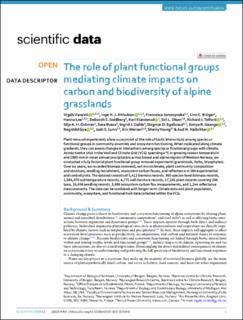The role of plant functional groups mediating climate impacts on carbon and biodiversity of alpine grasslands
Vandvik, Vigdis; Althuizen, Inge; Jaroszynska, Francesca; Krüger, Linn Cecilie; Lee, Hanna; Goldberg, Deborah E.; Klanderud, Kari; Olsen, Siri Lie; Telford, Richard James; Hjortland Östman, Silje Andrea; Busca, Sara; Dahle, Ingrid Johnsen; Egelkraut, Dagmar Dorothea; Geange, Sonya Rita; Gya, Ragnhild; Lynn, Joshua Scott; Meineri, Eric Pierre F; Young, Sherry; Halbritter Rechsteiner, Aud Helen
Peer reviewed, Journal article
Published version
Permanent lenke
https://hdl.handle.net/11250/3043907Utgivelsesdato
2022Metadata
Vis full innførselSamlinger
- Institutt for biologi [2526]
- Publikasjoner fra CRIStin - NTNU [37703]
Sammendrag
Plant removal experiments allow assessment of the role of biotic interactions among species or functional groups in community assembly and ecosystem functioning. When replicated along climate gradients, they can assess changes in interactions among species or functional groups with climate. Across twelve sites in the Vestland Climate Grid (VCG) spanning 4 °C in growing season temperature and 2000 mm in mean annual precipitation across boreal and alpine regions of Western Norway, we conducted a fully factorial plant functional group removal experiment (graminoids, forbs, bryophytes). Over six years, we recorded biomass removed, soil microclimate, plant community composition and structure, seedling recruitment, ecosystem carbon fluxes, and reflectance in 384 experimental and control plots. The dataset consists of 5,412 biomass records, 360 species-level biomass records, 1,084,970 soil temperature records, 4,771 soil moisture records, 17,181 plant records covering 206 taxa, 16,656 seedling records, 3,696 ecosystem carbon flux measurements, and 1,244 reflectance measurements. The data can be combined with longer-term climate data and plant population, community, ecosystem, and functional trait data collected within the VCG.

